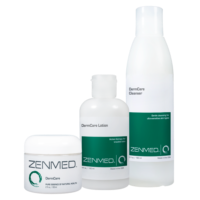It can be a trying time for children with eczema not only for the child suffering from it but also for the parent.
Eczema is a skin condition where the skin becomes red and inflamed. One of the most common forms of eczema is atopic dermatitis, which is sometimes referred to as infantile eczema and occurs in infants and older children. The causes for children with eczema can be due to certain allergies, immune system disorders or nutritional deficiencies.
 1 out of 10 children may develop eczema before they reach their fifth birthday. Symptoms generally start to appear within the first few months of their life. Over half of the children with eczema will overcome the condition by the time they reach their teenage years.
1 out of 10 children may develop eczema before they reach their fifth birthday. Symptoms generally start to appear within the first few months of their life. Over half of the children with eczema will overcome the condition by the time they reach their teenage years.
Children with eczema will often have a family member that suffers from asthma or hay fever and therefore the child may be genetically predisposed to suffer from eczema. They may even develop asthma or hay fever themselves later on in life.
Children with eczema usually develop itchy, dry, red skin and small bumps on their cheeks, forehead, or scalp. The rash may spread to the arms, legs and body.
As the condition worsens the child will try and relieve the systems by rubbing and scratching the affected area but this will make the condition a lot worse and can lead to thickened brownish areas on the skin. It is important that the child is encouraged not to scratch the affected area as this may help to prevent the condition getting worse, damaging the skin or infecting it.
Children with eczema may start to see the condition improve when they hit puberty, when their hormones start to change.
It has been said that eczema is inherited from a family member and cannot be prevented. There may be certain things that can cause flare ups or make the symptom worse and these should be avoided. They can include: pollen, dust, mold, strong soaps and washing powders, allowing the skin to become extra dry, certain fabrics and certain skin care products such as perfumes. Stress, heat, dairy products, acidic foods and tomatoes can also cause a flare up.
Your doctor may tell you to eliminate certain foods from your child’s diet to make sure that the problems aren’t caused by a food allergy. Once the condition has been confirmed as eczema then your doctor will recommend Topical corticosteroids, also called cortisone or steroid creams or ointments, are commonly used to treat eczema.
Natural remedies when treating children with eczema can be a lot kinder to your child’s body. It’s better to minimize the use of Doctor-prescribed cortisone creams. Especially in the case of small children, the skin damage done after years of using steroid creams can be irreversible.
 Seeking the natural, healthy path to taking care of your child’s eczema is the solution. By using a cream that contains only natural ingredients is the best treatment that your child should be receiving.
Seeking the natural, healthy path to taking care of your child’s eczema is the solution. By using a cream that contains only natural ingredients is the best treatment that your child should be receiving.
A diet rich in vitamins and minerals is essential for your child’s health. Giving your child lots of water to drink will add moisture to the skin. Bathing the affected areas with evening primrose oil, which can be extremely effective in treating children with eczema, can help moisturize the skin.
Applying a cool compress on the irritated areas of skin can also ease itching.
Children with eczema can certainly suffer some unpleasant times but taking the right preventative precautions can help keep their eczema under control.
